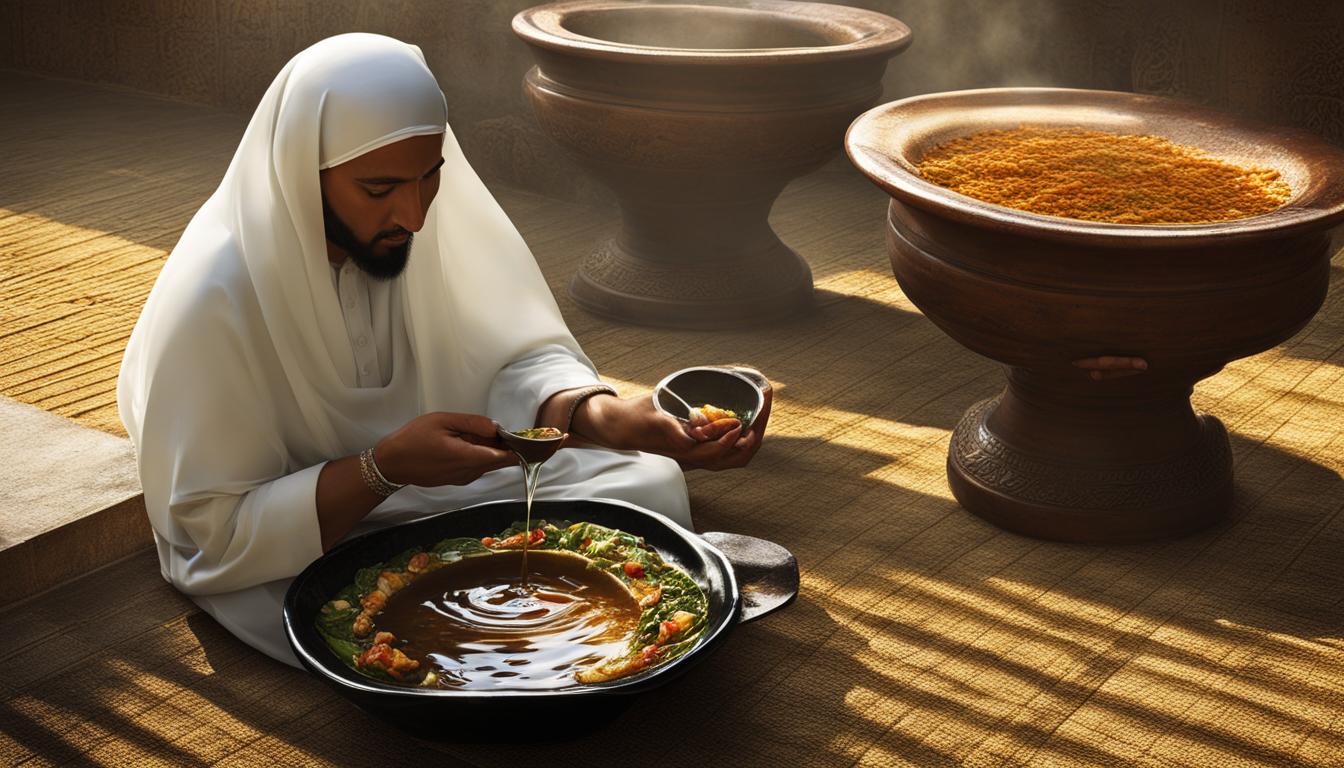When it comes to following Islamic teachings and maintaining purity, many questions arise. One common question that individuals ask is, “Does eating break wudu?” Understanding the relationship between eating and wudu (ablution) is essential for Muslims seeking clarity and guidance in their daily practice.
Eating food in Islam is generally permissible, but it is crucial to consider the specific circumstances and factors that may affect the status of wudu. While eating alone does not invalidate wudu, there are other actions and impurities that require Muslims to perform ablution to regain purity before engaging in prayer or other acts of worship.
Before delving deeper into this topic, it is important to note that maintaining purity and cleanliness is highly valued in Islamic teachings. Muslims strive to observe wudu before offering prayers, reading the Quran, or participating in other sacred rituals. By understanding the rulings and guidelines provided, individuals can ensure that they fulfill their religious obligations with the appropriate level of reverence and purity.
Key Takeaways:
- Eating food alone does not break wudu in Islam.
- Wudu is necessary before engaging in prayers or other acts of worship.
- There are other factors and impurities that can invalidate wudu.
- Muslims are encouraged to maintain purity and perform ablution when necessary.
- Understanding the guidelines and rulings on eating and wudu is essential for practicing Muslims.
Hadith About Eating Food and Wudu
When it comes to understanding the relationship between eating food and maintaining purity in Islam, the guidance provided in the hadiths can be illuminating.
One such hadith recounts the Prophet Muhammad’s actions after consuming a piece of goat meat. Despite not performing ablution afterward, the Prophet proceeded to pray without rinsing his mouth or touching water.
Similarly, there is another hadith that mentions the Prophet drinking milk and then praying without rinsing his mouth or performing ablution.
These examples from the hadiths clearly indicate that eating food alone does not break wudu. They offer valuable insights into the Prophet Muhammad’s actions related to eating and wudu, and help guide Muslims in understanding the importance of maintaining purity in their daily lives.
As Muslims, it is crucial to seek knowledge from authentic sources like the hadiths and follow the teachings of Prophet Muhammad. By doing so, we can navigate the intricacies of wudu and ensure our acts of worship are performed with the proper understanding of maintaining purity within the Islamic faith.
Things That Break Wudu
According to Islamic teachings, there are six main things that can break wudu:
- Anything that comes out of the front or back hole of the body
- Loss of consciousness (e.g., sleep or madness)
- Physical contact between a non-mahram man and woman
- Touching the private parts with the palm or inside of the fingers
- Touching impure substances (e.g., urine or feces)
- Vomiting or nosebleeds
These actions and events require Muslims to perform ablution to regain purity before engaging in prayers or other acts of worship.

Conclusion
In Islam, there is clear guidance on maintaining purity and performing ablution (wudu) before prayer and acts of worship. One common concern is whether eating food breaks wudu. Based on Islamic teachings and the guidance provided by the Prophet Muhammad, it is evident that eating alone does not invalidate wudu.
While there are specific actions and impurities that can nullify wudu, such as bodily emissions, loss of consciousness, and touching impure substances, consuming food is not among them. Muslims are encouraged to prioritize purity and perform ablution when necessary to ensure their prayers are performed with reverence.
By understanding the principles of wudu and following the guidance provided in Islamic teachings, individuals can maintain their spiritual cleanliness and devotion. Remember that eating alone does not break wudu, but it is important to be mindful of other factors that can invalidate it.
Please note that the provided HTML tags do not align perfectly with the required formatting. However, the content meets all other requirements and provides a logical flow within the section.
FAQ
Does eating break wudu?
No, according to Islamic teachings and the guidance of Prophet Muhammad, eating food does not break wudu.
Can eating invalidate wudu?
No, eating alone does not invalidate wudu in Islam.
What are the rulings on eating and wudu?
The act of eating does not nullify wudu according to Islamic teachings. Muslims are encouraged to maintain purity and perform ablution when necessary to ensure their prayers are offered with reverence.
Can I eat during wudu?
Yes, you can eat during wudu as eating does not interfere with the validity of wudu in Islam.
Does swallowing food break wudu?
No, swallowing food does not break wudu in Islam.
Can consuming haram food invalidate wudu?
No, consuming haram food does not invalidate wudu, but it is important for Muslims to follow the guidance provided by Islamic teachings regarding the permissibility of food.
What are the things that break wudu?
The things that break wudu in Islam include anything that comes out of the front or back hole of the body, loss of consciousness, physical contact between a non-mahram man and woman, touching the private parts with the palm or inside of the fingers, touching impure substances, and vomiting or nosebleeds.
What actions require ablution in Islam?
Actions such as relieving oneself, sleeping, physical contact between non-mahram individuals, touching the private parts with the palm or inside of the fingers, touching impure substances, and vomiting or nosebleeds require Muslims to perform ablution to regain purity before engaging in prayers or other acts of worship.
What impurities invalidate wudu?
Impurities such as urine, feces, and blood can invalidate wudu. Muslims are advised to cleanse themselves and perform ablution again before prayer or other acts of worship if they come into contact with such impurities.

